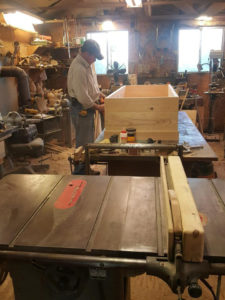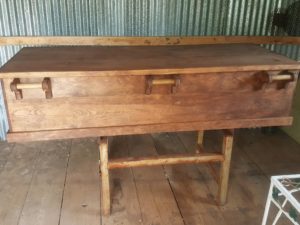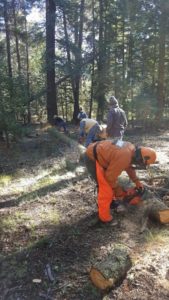 [1]
[1]
Making simple wooden coffins for members of the Navajo Nation quashed by the COVID-19 pandemic is God’s work, says Scott Hill, a layman at Canelo Cowboy Church, a Southern Baptist congregation in far southeast Arizona.
Hill builds the burial chests when he’s not out “soliciting”—his word—in the wake of the COVID-19 pandemic for nonperishable food, cleaning supplies, paper goods, and youngsters’ toys and games to give to as many as possible of the 173,000 or more people living on Navajo land in Arizona, New Mexico, and Utah, the largest reservation in the nation.
“I guess I just love the Navajo people,” Hill told SBC LIFE. “They’re probably more affected by this COVID thing than anyone else in the US.”
The national news media on May 18 reported COVID-19 has hit harder per capita in the Navajo nation than even New York.
“The Navajo nation has 4,071 coronavirus cases and 142 deaths as of Monday, meaning the disease has penetrated 2.3 percent of the population, compared to New York’s 1.8 percent penetration rate,” CNN reported.
“They live in such poor conditions,” Hill said of many Navajo. “Most don’t have running water or indoor plumbing. Doctors and hospitals are great distances [away], and many don’t have vehicles. No internet.
“On top of that they’re very family, very clan oriented. They get together, several generations, extended families, and [unknowingly] spread this disease and are out in these remote areas with no way to communicate,” Hill continued. “It’s just a bad, bad situation.”
Hill, though now in his mid-sixties and retired, is a carpenter by trade. Over the years he has built “just about everything,” so he knew what to do when he was asked to make coffins for the Navajo.
“It gripped my heart to hear they were burying them in blankets,” Hill said.
The Tribal Council in Window Rock, Arizona, gives $2,500 to families when there is a death, to help with burial expenses, Hill explained. But because of COVID-19, the offices are closed. The Navajo nation’s 110 Chapter Houses, which are to help people within a 150-mile radius—these are where people typically get their water and emergency supplies and money—steps in when the Tribal Council can’t. But they too are closed because of the virus.
The people are on their own, and shopping of anything on the reservation is severely limited. No Walmart or chain grocery stores, just small and far-flung trading posts.
The first case of COVID-19 on the Navajo nation was identified March 17. Three days later, a stay-at-home directive and curfew were in place. Within a month, pantries were bare and reports began trickling out of the dire need, of parents who hadn’t been eating so their children wouldn’t go hungry, of babies ceaselessly whimpering, of sickness everywhere.
That’s when Hill got involved.
Known by the Navajo because of his volunteer efforts over the years, Hill received a letter from the Native Women Christian Ministry (NWCM), asking if he could bring food, diapers, toys for kids, and other items to a non-denominational church in Houck, Arizona. Houck is in Apache County and borders New Mexico, one of the hardest-hit areas by the pandemic.
The NWCM members would safely distribute everything to people who lived in isolated areas, Hill was told.
They also asked for coffins.

“I just started soliciting for donations and hooked up with a Conservative Baptist Church in Sonoita [Arizona] and got a huge response from them,” Hill said. “[Pastor] Larry Lane at Village Meadows [Southern] Baptist Church in Sierra Vista and I loaded a trailer last Friday [May 15] with food, paper goods and toys, and two coffins, and took that to Houck.
“Without Pastor Larry Lane and his selfless example of servanthood, I’m not sure I would be the same person,” Hill said. He was a member of Village Meadows for several years before moving his membership to what in 2006 was the new Canelo Cowboy Church, a thirty-five-mile drive nearer his country home than was Village Meadows. Today Hill is the missions director of Canelo Cowboy Church.
“It’s way more about Jesus than it is me,” Hill said. “This is just one way we can help the Navajo people.”
Hill showed his cell phone to an onsite journalist last week, who reported it was “filled with text messages from some members of the reservation who were asking for help and saying the Navajo people had been left behind.”
Now in the process of gathering more food, paper goods, other supplies, toys, and games with the help of Village Meadow Baptist Church, Canelo Cowboy Church, Sonoita Bible Church, and others—even local businesses and industries—Hill plans to take a trailer-load to Eagle Springs (Southern) Baptist Church near Cuba, New Mexico, in mid-June. Eagle Springs is one of several churches he has helped build over the years.
“They asked me three weeks ago for coffins,” Hill said.
Hill makes the coffins out of inch-and-a-quarter thick white fir, a wood “somewhat better” than pine. Most are seventy-four inches long, thirty inches wide, and sixteen inches deep, though the size can vary depending on the size of the person. He adds six wooden handles, and finishes by staining the wood a light walnut.
“It takes a day-and-a-half, two days, to build a coffin,” Hill said. “Costs about $250 for just the materials. I get a good deal on the wood from a local guy who’s a custom stair-builder. It was coming out of my pocket, but people have been stepping up.”

Hill’s concern for the Navajo people dates back for nearly twenty years. That’s when he started cutting firewood for the elderly, widows, and infirm on the reservation with others from Village Meadows Baptist. That ministry has grown to include up to twenty men camping out for a week, in the fall and again in the spring, in the White Mountains national forest of northeastern Arizona.
The men cut down Douglas Fir trees that tower sixty to eighty feet overhead, split the timber into about twenty-five cords of heating and cooking firewood, and take it to Houck for distribution.
“I’ve always had a concern and a like for the Navajo people,” Hill said. “I pray over each coffin, put it into God’s hands to comfort the families.
“My motto is to preach the Gospel and not say a word,” Hill continued. “Instead of talking and preaching, we do whatever we can for them, and then if they ask why we do this, then we share the Gospel. We just hope they will see God’s love for them through what we do.”
